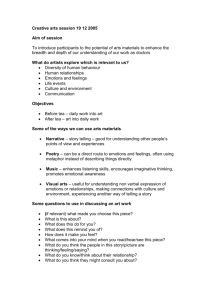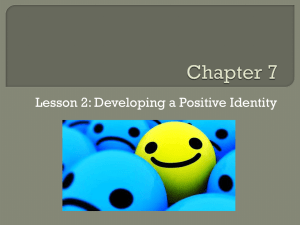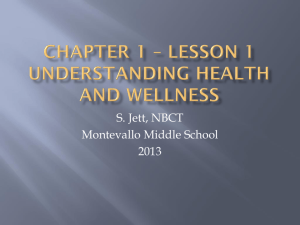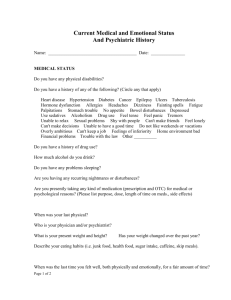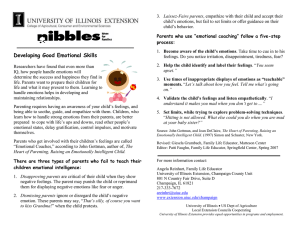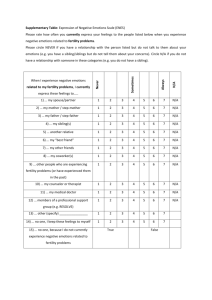All Quiet on the Western Front
advertisement
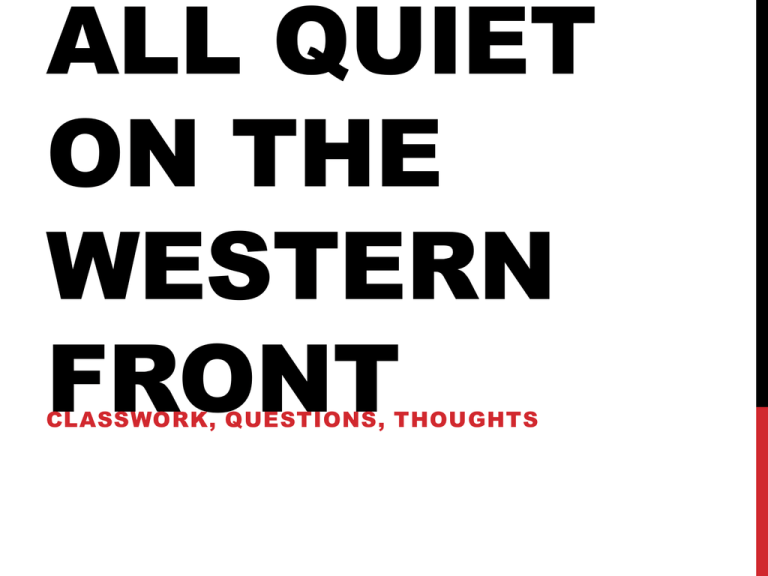
ALL QUIET ON THE WESTERN FRONT CLASSWORK, QUESTIONS, THOUGHTS CHAPTER 4 Warm-up: •Skim back through chapters 1-4 and identify 4 examples of figurative language •Explain what they mean CHAPTER 4 Write a paragraph comparing and contrasting the Propaganda Posters with the events of Chapter 4. CHAPTER 6-7 Warm-up: Identify 4 memorable instances of words in Chapters 6-7 that seem to be used for their connotative power and explain how/why they are used. For example: “…thus we stagger forward, and into our pierced and shattered souls bores the torturing image of the brown earth with the greasy sun and the convulsed and dead soldiers…” (115). Remarque seems to use “greasy” to describe the sun in order to emphasize the horror and disgust that Baumer feels. The fighting has turned even the sunshine into something gross. CHAPTER 6 In Chapter 6, Paul daydreams about his home. 1. What specific things does he recall in his daydream? 2. How do his memories affect him? 3. Why does he say of himself and his friend, “I believe we are lost”? 4. Reread Paul’s reflections in Chapter 6. Then write a paraphrase of the passage. Use third person. In your concluding sentence, explain the significance of Paul’s daydream. CHAPTER 7 Review the section in Chapter 7 in which Paul returns home (1541. How does he act when he is there? 2. How does he feel? 3. Why does he make the statement he does at the very end of the chapter? 4. Do you think that talking about traumatic experiences is a good idea? Why or why not? CHAPTER 8 When people are under severe stress or dealing with strong negative emotions, they often fall back on certain coping strategies. Also called defense mechanisms, these strategies may temporarily protect a person from painful situations or thoughts, but they usually do not work as longterm solutions. Common coping strategies include: o Denial – refusing to recognize an emotion or problem o Compensation – making up for a weakness in one area by excelling in another o Daydreaming – inventing situations to escape unpleasant realities o Displacement – transferring emotions from the true source to some other thing or person o Rationalization – making excuses for one’s actions or feelings o Regression – returning to immature behavior to express emotions Find examples of these strategies as used by Paul or other characters in the novel. What other strategies do the soldiers in the novel use to cope with the unbearable stress of war? CHAPTER 9-10 How does the incident in the foxhole with the French soldier affect Paul? Contrast his feelings while in the foxhole with his feelings afterward. Interpret Paul’s comment at the end of Chapter 9: “After all, war is war.” What makes him say this, and what does he mean by it? Think carefully about Paul’s lengthy and detailed description of life in the hospital and then about his brief (5 sentences) description covering the next weeks on page 269. Why these sweeping facts in such a short passage?
